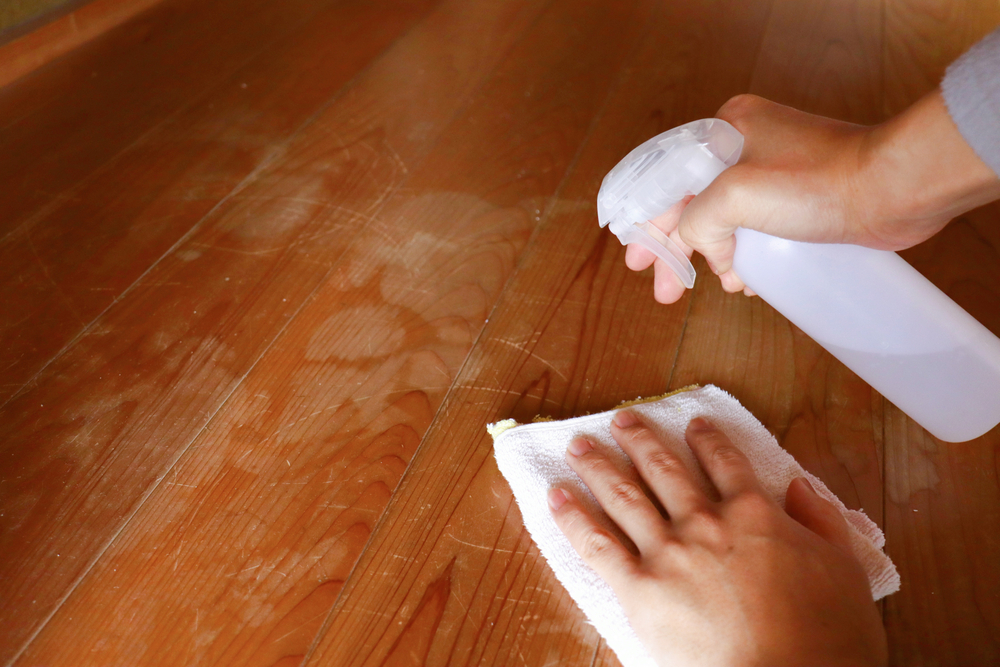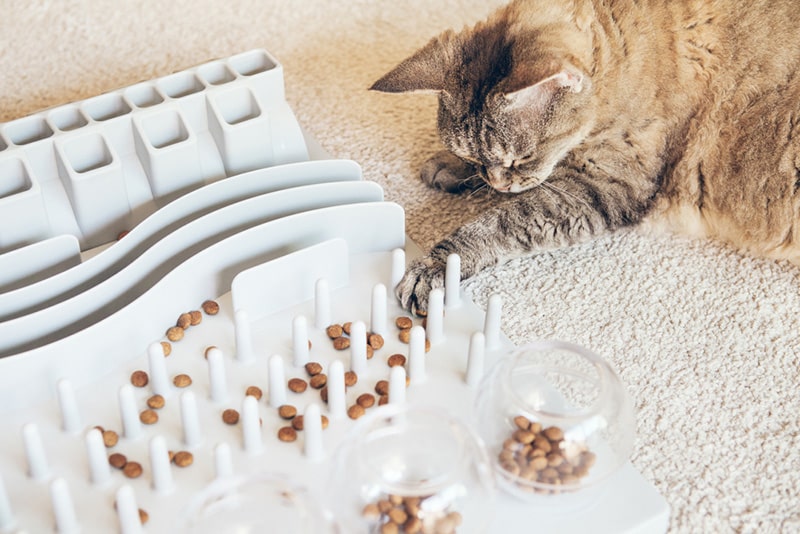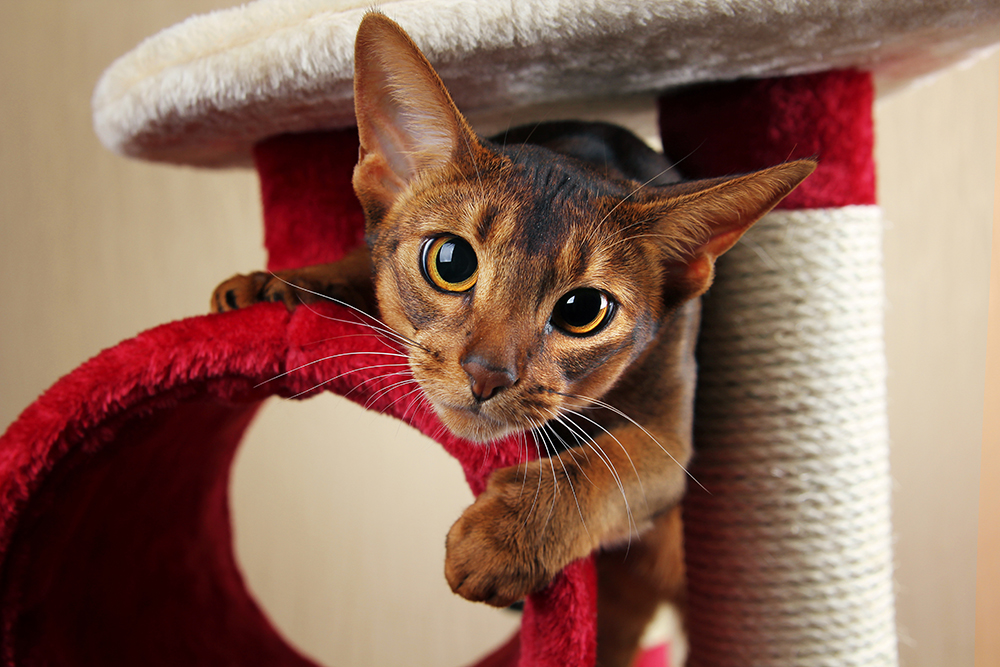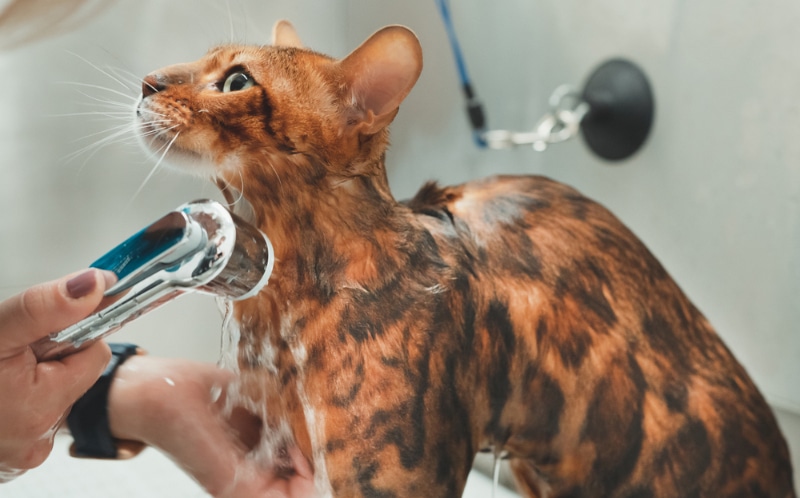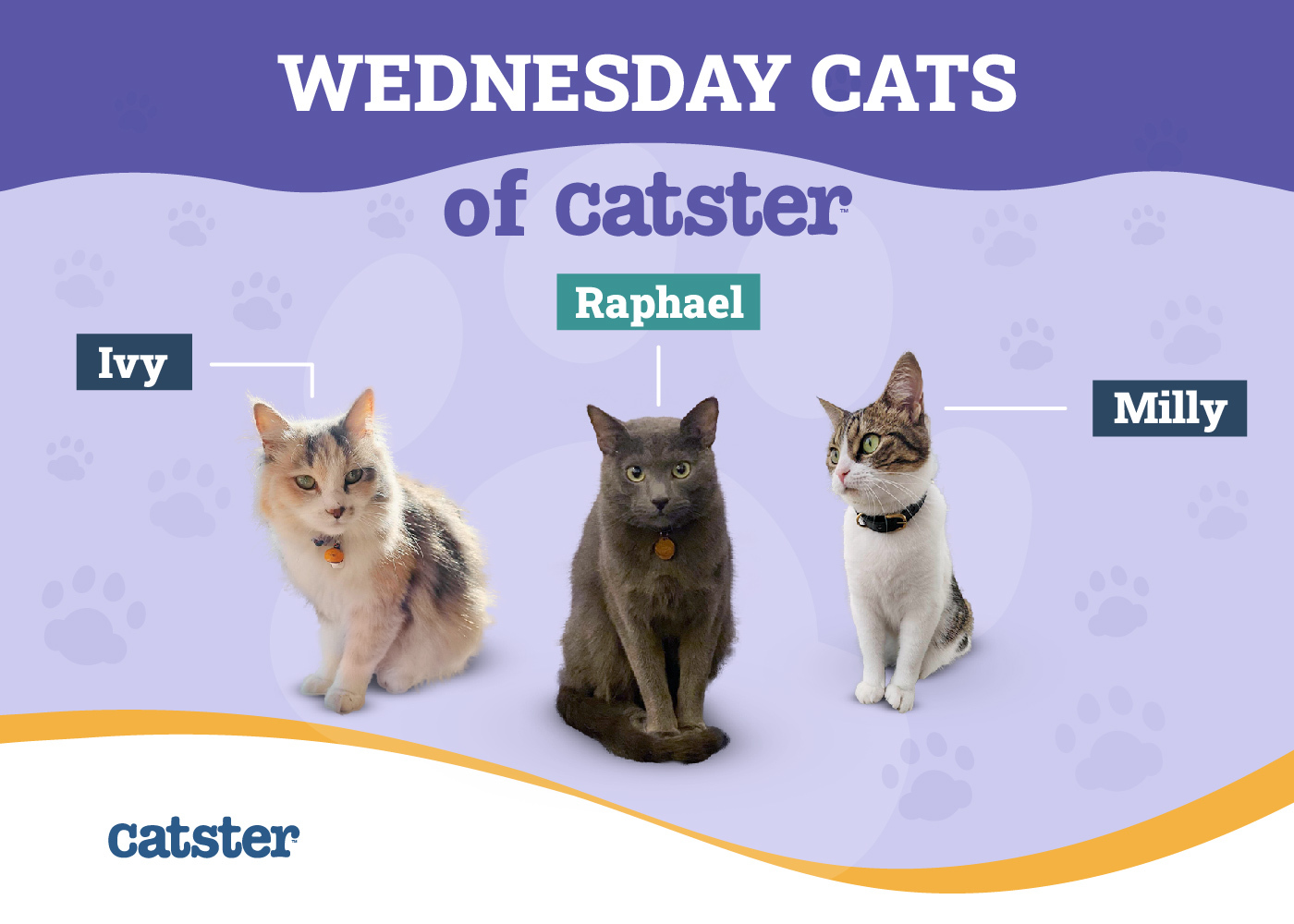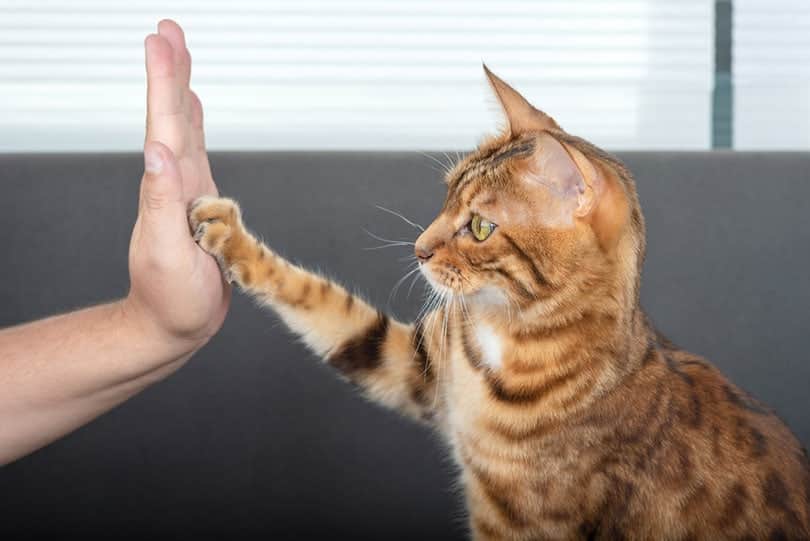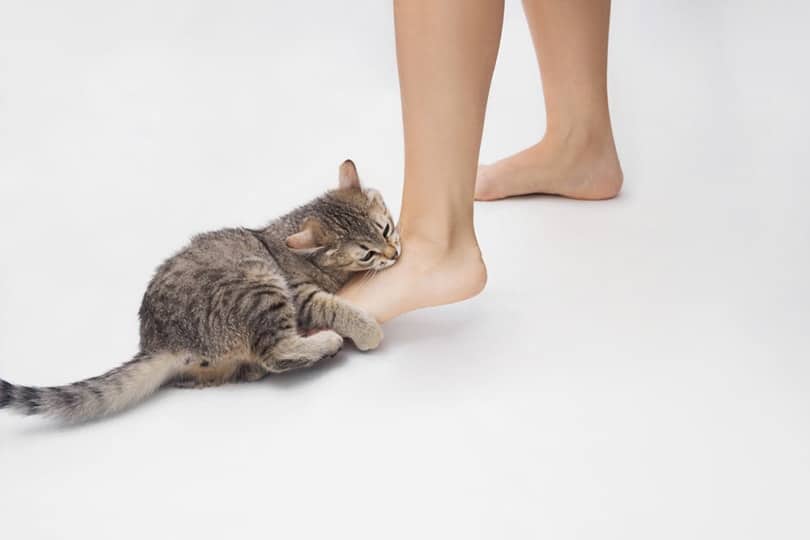Click to Skip Ahead
Beautiful original wood flooring is the pride of many homeowners. It’s nice to look at and easy to clean—until your cat decides to pee all over it. The mess has been there for a few hours, but no problem, you think; it’ll just take a quick minute to wipe it up, and then it’ll be done. But now the cat urine has soaked into the wood, So now what? Read on to learn how to get cat pee out of wood, both the smell and the stain!

Cat Pee on Wood Floors
It depends on how quickly you catch it. By design, cats produce pungent, ammonia-smelling urine that lasts and lasts. Normal urine is definitely pungent, but the odor takes on a whole new level when cats spray. When cats spray urine (for territorial marking), it has a far more pungent odor; however, spraying is usually done on vertical surfaces. Nonetheless, it can sometimes splash onto your wooden floors as well.
Unfortunately, the longer the pee sits on the surface, the less likely the smell will “go away.” It can take 5 years of “airing it out” by opening all the windows of your house to eliminate it without working on it, but chances are that you want it out of your floor sooner than that.
Sometimes, you move into an old house and the smell is everywhere. In this case, you may have to replace the floor and subfloor, as the cat pee can soak into even that layer of flooring.
To get the cat pee smell out of your hardwood floors, you will have to get aggressive with it.
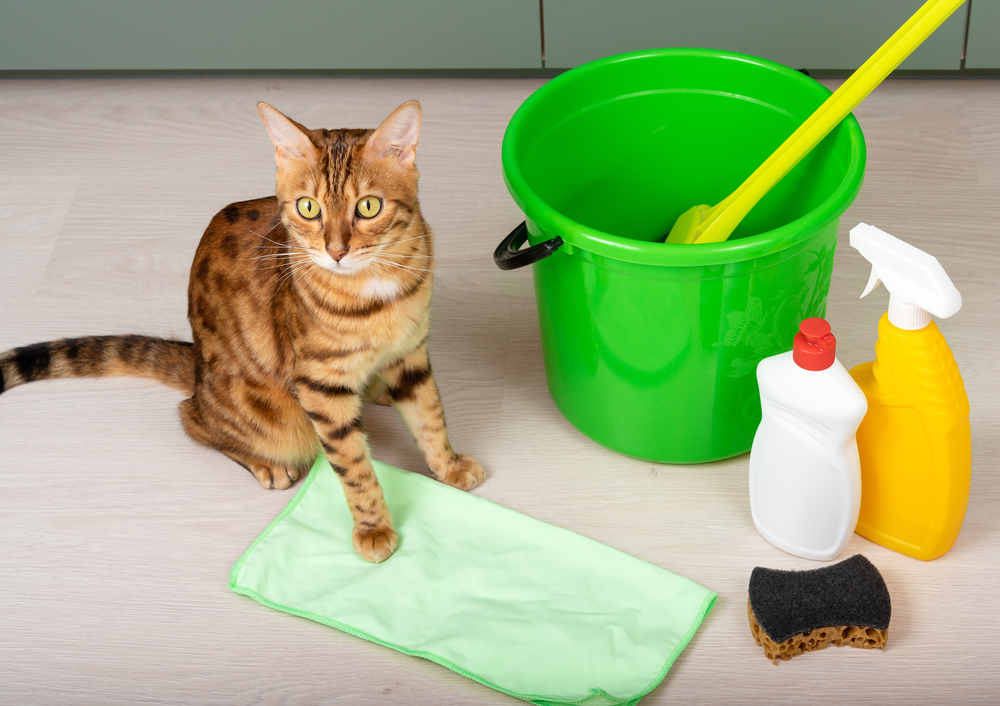

How to Get Cat Pee Out of Wood
Cleaning the “accident” as soon as you can is the best line of defense when it comes to getting rid of the mess and the smell. If a few hours have passed since the deed has been done, you will probably have to work harder to get the smell out. However, it’s not an impossible task.
What You Need
- Disposable towels (paper towels) and a trash can
- A disposable sponge with a bucket
- A disinfectant
- Gloves
- Hardwood cleaner
- Pet odor-removing cleaner
- Mop or towel

The 5 Steps on How to Get Cat Pee Smell Out of Wood
1. Disinfect the Area
It might be tempting to immediately clean up the mess due to the odor. However, for health and safety reasons, it’s best to begin by spraying the urine and the surrounding area with a disinfectant and leaving it be for 5 minutes. This ensures that the disinfectant has enough time to destroy any harmful bacteria or pathogens that could be a health risk to you.
2. Soak up Urine With Paper Towels or a Sponge
Time to roll up your sleeves and put on your gloves. For people who don’t mind using up paper towels, soak up the pee with paper towels, and dispose of them by placing them in a trash bag, sealing it, and then placing the sealed trash bag in another bag before discarding it. In addition, you could take a disposable sponge to soak it up and squeeze the sponge into a trash bag as well, then discard the sponge with the urine.

3. Clean With Your Favorite Hardwood Cleaner
Sealed hardwood will keep the cat pee smell out of your wood floors better than unsealed. If your floor is sealed, the next step after mopping up the mess will be to clean the floor with a normal hardwood floor cleaner. This will make the surface clean in a way that’s safe for your wood floors.
4. Use a Pet-specific Cleaner
If your hardwood is unsealed or came from a factory, you will probably need to buy a cleaner that’s made to remove pet stains and odors. These cleaners contain the enzymes that are necessary to kill the bacteria causing the strong smell from the urine.
Our Favorite Enzyme Cleaner
The Hepper Advanced Bio-Enzyme Pet Stain & Odor Eliminator Spray is our favorite enzyme cleaner out there. It permanently removes even the very worst kitty stains and smells, leaving your home fresh and clean! Click here to learn more about this amazing product and get yourself a bottle.

Hydrogen peroxide and wood floors
Hydrogen peroxide is a natural cleaner that can remove the urine smell from wood floors. This method calls for soaking the affected area with the solution and covering it with plastic wrap. But will it damage the floor?
Although this method is recommended by some, do be aware that it could lighten the color of your hardwood floor. If you’re using hydrogen peroxide to get the cat pee smell out of your floor, be prepared to go through the work of sanding, re-staining, and sealing your wood floor.
Vinegar as an odor neutralizer
Are you looking for a more natural solution to the cat pee problem? Vinegar is a known odor neutralizer and could work to eliminate the cat pee smell. Make sure to test it in an inconspicuous area before trying it out in plain sight.
An acceptable cleaning solution can be made with the following: 1 cup water, 1/3 cup distilled white vinegar, 1/4 cup baking soda and 1/4 mild dish soap. Put it all in a spray bottle, and shake it up. Spray it on the smelly spot, and rub it in with a cloth, letting it stand for at least 15 minutes. Then, rinse with water.
5. Seek Professional Help
By now, if you’ve tried everything we’ve suggested so far, and the smell is still there, you might be pulling your hair out. Deep stains will need professional work to correctly deal with the problem and might save some of your sanity too. Professionals have the expertise and top-of-the-line equipment to get the job done.
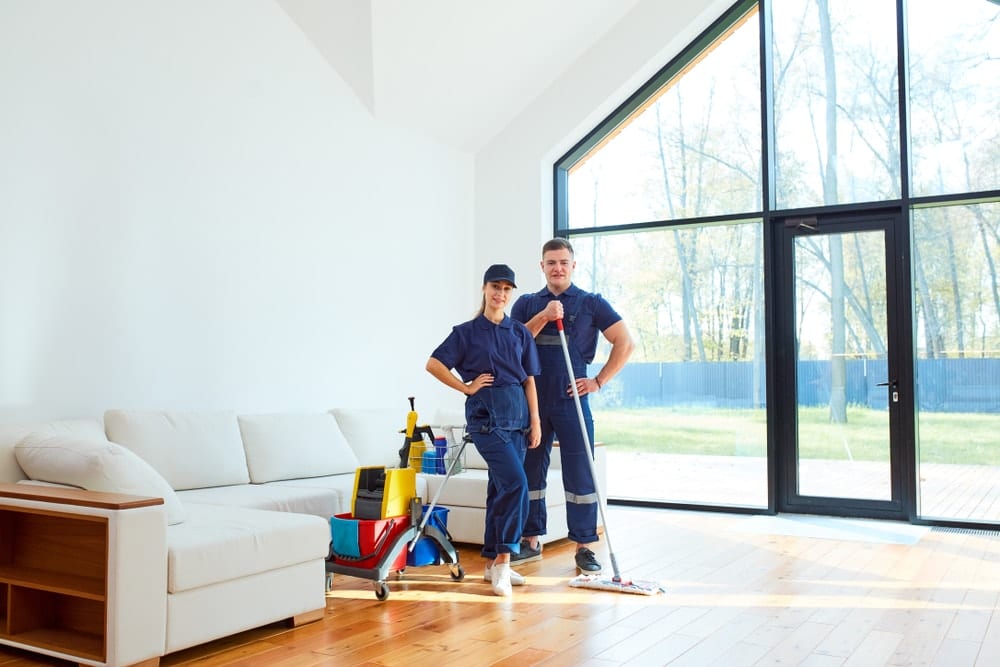

How Do I Get My Cat to Stop Peeing on Everything?
Now that your cat pee smell is out of your wood floors, you might be wondering how to prevent it from happening in the future. We’ve got you covered with these quick tips.
1. Remove the Stain Quickly
Cats can smell where they peed before and usually will return to that same spot to relieve themselves over and over again. Prevent this from happening by cleaning the spot quickly and thoroughly.
2. Change the Litter Box Often
When the litter box is full and disgusting to you, realize your cat has similar sentiments, even to the extent that they will refuse to “go” there. Make it a nice place for you and your cat by keeping the box clean and changing the litter when recommended (thoroughly clean and disinfect the entire box at least once a week).
3. Relieve Stress
Cats tend to stress pee in odd locations at times. Try to determine what might be causing them stress and help them by removing the stressful thing, if possible.
4. Check for Medical Issues
When cats have medical issues like urinary tract infections or diabetes, they will pee a lot and might have accidents on the floor. This will require a checkup with your vet, who can diagnose these issues and prescribe the right medication for your feline.

Conclusion
Although we all love our kitties dearly, nobody loves the smell of their pee, especially when it’s been soaked into the floor. You can do things to help prevent this from happening, but sometimes it happens anyway. Now you know how to eliminate cat urine odor and stains quickly and effectively, so everyone in your home can be happy again.
Related Reads:
Featured Image Credit: umaruchan4678, Shutterstock

